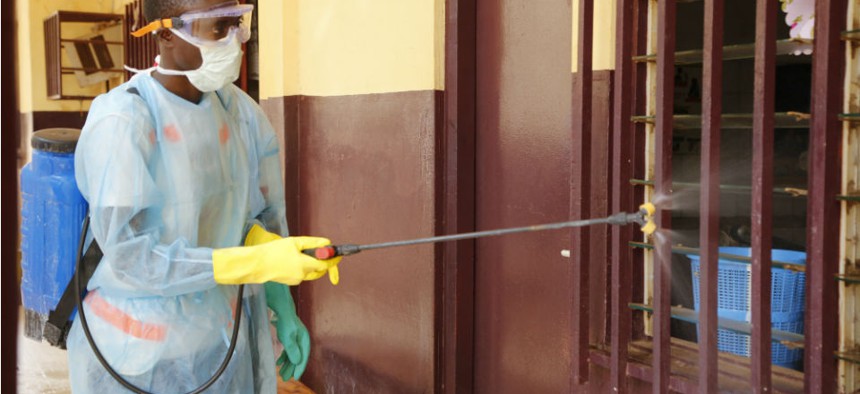
Volunteers with Red Cross Society of Guinea disinfect homes and health facilities affected by the virus. afreecom/Idrissa Soumaré European Commission DG ECHO
Four Reasons Why This Ebola Outbreak Is Different
Outbreak has spread to city centers, and is in an area where there is a distrust of Western medicine.
West Africa is currently in the midst of the largest Ebola outbreak in history, and it's only getting worse.
Nearly 1,000 people have died and more than 1,700 have been infected by the deadly virus since the outbreak began in March, according to the latest data from the World Health Organization. The death toll is already nearly four times as high as the next highest on record, which occurred in the first documented outbreak in 1976.
And the virus shows no signs of letting up, leading WHO to declare the outbreak a "public health emergency of international concern" early Friday morning. The designation will require the agency to make recommendations for immediate international action against the outbreak and ramp up response, which many health experts say has been lacking.
The announcement was made by WHO Director General Margaret Chan at the conclusion of a two-day emergency meeting this week on how to deal with the virus.
To receive the designation, an outbreak must meet at least two of the following four criteria: Is the public health impact of this event potentially serious? Is this event unusual or unexpected? Is there the potential for international spread? And is there the potential for travel and trade restrictions?
There have been two cases given the designation since the regulations were put into place in 2005: the influenza outbreak in 2009, and the polio outbreak in the spring of this year.
There have been about 30 recorded outbreaks of the Ebola virus in the last four decades, but none have come close to this magnitude.
"This is something we have not seen to this extent before," CDC Director Thomas Frieden told a House subcommittee Thursday. Frieden said this outbreak is set to infect more people than all the previous outbreaks combined.
So why is this time so different?
1. This is the first time an Ebola outbreak has occurred in West African countries.
The current Ebola outbreak began in New Guinea in March, then moved to Sierra Leone, Liberia, and Nigeria, none of which have ever had an Ebola outbreak before. Previous outbreaks of the virus have all occurred primarily in Central African countries, such as the Democratic Republic of Congo, Uganda, and South Sudan.
That means that this time the countries were taken by surprise, and unequipped to deal with the outbreak—or took action too late. Health officials were slow to respond, workers aren't familiar with the necessary equipment, and health infrastructure is lacking.
Furthermore, the general public does not understand what is going on, and may not follow necessary measures to contain the outbreak and seek medical care.
"In Central Africa there's a historical perspective," said Michael Osterholm, director of the Center for Infectious Disease Research and Policy at the University of Minnesota. "When [outbreaks] happen, people realize [aid workers] come in and do things and go away—they don't have that here, because it's never happened before."
"They see sick people sent to the hospital come back in a body bag. If your loved one was carted away alive and talking and comes back in a body bag, would you send them there?"
2. There is tremendous mistrust of nontraditional or Western medicine in these areas.
"The communities have these entrenched beliefs and support for certain religions and medical practices and have sought out those practices and not necessarily followed the direction of public health authorities," said Josh Michaud, associate director of global health policy at the Kaiser Family Foundation. "They are prone to rumors and fear—rather than seek out treatment centers, they flee."
Fear of the disease has resulted in hostility toward aid groups such as Doctors Without Borders and the Red Cross, because people believe they are bringing the virus into their communities.
Furthermore, traditional funeral practices involve close contact with the deceased victim, potentially spreading the disease to living family members.
3. This is the first time an outbreak has spread to city centers.
The urbanization of the virus has made it more difficult to track, trace, and contain.
"One of the most distinguishing features in this outbreak is that it involves cities," said Daniel Lucey, adjunct professor of microbiology and immunology at Georgetown University Medical Center. "When outbreaks were rural, they were easier to control—you could quarantine people who were sick and stop the outbreak.... When it got into three capital cities, it became harder to control."
The move to urban centers make it far easier for the virus to spread more quickly and over far greater distances, due to increased transportation access and higher population density.
4. The response has not kept up with the virus.
The Ebola outbreak caught on and spread quickly, while the response—particularly internationally—moved more slowly.
"If you think about what used to be an appropriate match in terms of a response to an outbreak such that the response overwhelms it, then relative to the current [situation], it was easier when in it occurred in one rural area," Lucey said. "In this outbreak the response has not matched or achieved the scope of the virus, and it spread over time."
The countries grappling with the outbreak simply do not have sufficient resources—personnel or otherwise—to effectively contain it, particularly given the other factors working against them.
"What was a small forest fire of infection that could been controlled by some good fire crews ... that didn't happen," said Osterholm. "NGOs are tapped out—some people have been on the front lines for weeks and weeks. As more colleagues get sick and die, and they are asked to do more more—it's a recipe for them to get infected [too]. They've got to get more resources."







